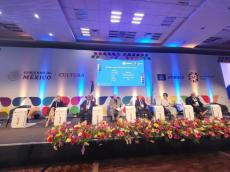|
|
TODAY.AZ / Society
Culture minister calls for UNESCO technical mission to Azerbaijan's Karabakh
01 October 2022 [11:33] - TODAY.AZ

By Azernews
By Laman Ismayilova
Azerbaijani Culture Minister Anar Karimov has addressed the UNESCO-MONDIACULT 2022 World Conference in Mexico, Azernews reports, citing Azertac.
The main goal of the conference is to shape a more robust and resilient cultural sector, fully anchored in the perspectives of sustainable development as well as promotion of solidarity, peace, and security, in line with the vision enshrined in the UN Secretary-General's report "Our Common Agenda" (September 2021), which refers to culture as a global public good, for the good of us all.
In his speech, the minister drew the participants' attention to the ethnocultural genocide (ethnocide) committed by Armenia in Azerbaijan's formerly occupied territories for nearly 30 years.
Many mosques, historical monuments, and various cultural institutions were completely destroyed as a result of unprecedented systematic and purposeful actions against the Azerbaijan's cultural heritage during the Armenian occupation.
He emphasized that those acts of genocide against Azerbaijani historical and cultural heritage were met with silence by international organizations.
Karimov noted that after liberating its lands from occupation, Azerbaijan started large-scale restoration, including the restoration of cultural heritage.
In this regard, the minister said that the cultural heritage located in the territory of Azerbaijan reflects the cultural diversity of the country and expressed the importance of protecting and restoring all cultural and religious monuments, regardless of their origin.
Anar Karimov appealed to UNESCO for a technical mission to be dispatched to Karabakh.
He mentioned that the global campaign can be applied as a model of promoting peace in the existing post-conflict situations in different regions of the world.
During the session, Minister Karimov as the representative of Azerbaijan, chairing the Non-Aligned Movement (NAM), made a statement on behalf of the NAM member states. In the statement, the UN countries condemn all forms of racism, racial discrimination, xenophobia, and intolerance, and noted the importance of national, regional, and international initiatives for the protection of cultural properties.
URL: http://www.today.az/news/society/226239.html
 Print version
Print version
Connect with us. Get latest news and updates.
See Also
- 24 April 2025 [14:18]
Astara terminal upgrade and bridge construction near completion - 24 April 2025 [11:54]
Khankendi to host 17th Economic Cooperation Organization Summit - 24 April 2025 [11:23]
Azerkosmos prepares to launch new generation satellite systems - 23 April 2025 [11:03]
Six-lane highway takes shape between Heydar Aliyev avenue and Ziya Bunyadov avenue - 22 April 2025 [15:17]
Azerbaijan’s ACG project delivers massive oil and gas returns - 22 April 2025 [13:28]
Condolence book opened following passing of Pope Francis - 22 April 2025 [12:56]
Cultural agency fights against Armenia's misappropriation of heritage - 22 April 2025 [12:02]
ICYF Eurasian Center presents mine victim rights platform at UN ECOSOC Youth Forum - 22 April 2025 [11:27]
Drone-assisted drug smuggling attempt from Iran to Azerbaijan thwarted at border - 21 April 2025 [11:57]
Proposal to establish Turkic World Science Center at Garabagh University
Most Popular
 Culture Minister meets with Kyrgyz counterpart in Bishkek
Culture Minister meets with Kyrgyz counterpart in Bishkek
 Trump sees hope for Ukraine-Russia deal, analysts remain skeptical
Trump sees hope for Ukraine-Russia deal, analysts remain skeptical
 Azerbaijan's Chamber of Accounts urges strengthening audits on renewables & green budgeting
Azerbaijan's Chamber of Accounts urges strengthening audits on renewables & green budgeting
 Azerbaijan and China sign mutual visa exemption agreement for ordinary passport holders
Azerbaijan and China sign mutual visa exemption agreement for ordinary passport holders
 Oil exports from Azerbaijan to Tabriz may be on agenda during Pezeshkian's visit to Baku
Oil exports from Azerbaijan to Tabriz may be on agenda during Pezeshkian's visit to Baku
 Israeli media spotlights Azerbaijan’s rising regional clout as strategic Eurasian mediator
Israeli media spotlights Azerbaijan’s rising regional clout as strategic Eurasian mediator
 Leyla Aliyeva meets with Vice-President of Vietnam to expand humanitarian and cultural ties
Leyla Aliyeva meets with Vice-President of Vietnam to expand humanitarian and cultural ties
